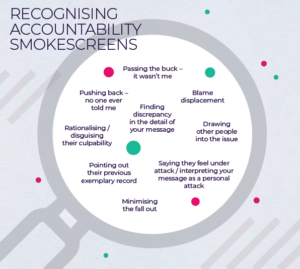


Building accountability in those around you should be a central part of your mindset. But it can be a challenge to keep colleagues committed to a clear-eyed appraisal of their own contributions. How can you ensure accountability forms the backbone of your organisation?
When performance hits the buffers, questions need to be asked. But getting to the bottom of the problem can sometimes be more of a challenge than getting things back on track. Start by asking yourself if you were clear enough with your brief. Did you set out a well defined description of the task, along with your expectations of what success would look like? Did you lay out a clear chain of accountability with established authority lines and escalation guidelines? Most importantly did you check commitment to the deliverable and the deadline? If you want your team to demonstrate accountability then you need to make sure everyone is clear about what’s expected and where responsibilities lie.
Regular check-ins with team members are the best way to ensure performance is on track. But beware: it’s often at check-ins that managers take back the more difficult projects or tasks. It can be tempting to relieve a struggling worker of their burden and take on the stress yourself. See this instead as the perfect opportunity to exercise your coaching/mentoring skills. Guide team members to diagnose the source of the challenge and help them to work out possible solutions. Key questions to ask include: ‘Why is this happening?’, ‘What have you tried so far?’ and ‘What could you do differently?’ A friendly steer here will encourage team members to explore a sticky situation as well as establish accountability for the solution. Before you wrap up, agree clear actions and timelines and check back in to ensure everything is back on track.
Regular check-ins are also an opportunity to challenge the ‘anything but me’ mindset that can lead to performance problems. Make the question ‘In what way might you have contributed to the issue?’ a regular feature of your check-ins. Avoid the blame game and make it clear that you ask yourself the same question. Most team members will be happy to accept accountability if they see that everyone else has – and that it will help make them better at their job.
So results aren’t what you expected and you need to work out why. One of the most uncomfortable conversations for any manager is unpicking the reasons for failure with a team member. Encouraging them to make a clear-eyed appraisal of the facts and accept some uncomfortable truths about their performance is not a task for the faint-hearted. Take the responsibility to build psychological safety into the conversation and allow a positive and meaningful exchange. Avoid blaming and shaming as well as giving your team member excuses or a free pass. Together, explore the potential impact of the failure but ensure that the groundwork for future positives is laid down too: this difficult conversation can become an example of your commitment to continuous improvement. Explore what could have gone better this time, what will need to be done differently next time – and how you will both ensure it does.
